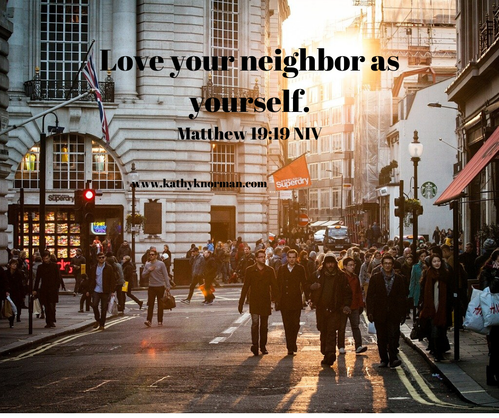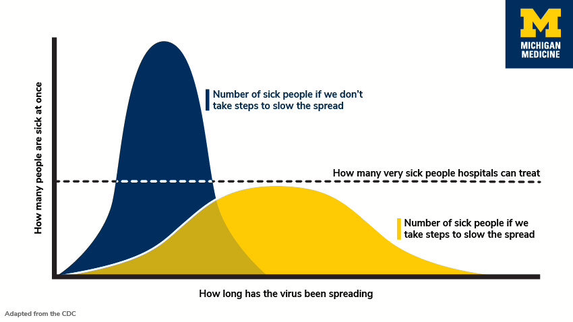I’m an Enneagram 8: The Challenger. So, naturally, my go to response in most situations is to encourage folks to action, often quite emphatically. It’s so innately my normal default position, that I don’t even realize I’m doing it most of the time.
Under normal circumstances, if I were writing a devotional on the importance of loving our neighbors, I would challenge you to get out and get busy with lots of suggestions for hands on ministry and engagement with those in need.
But these are not normal circumstances. We are living in the middle of a pandemic of the Covid-19 coronavirus. To stop the spread, it is essential to practice social distancing, cancel events, and stay at home. So, how do we love our neighbors well during this once in a lifetime event? I have ten suggestions.
- Stay informed. Check out current recommendations on the websites for the Centers for Disease Control at CDC and the World Health Organization at WHO. Check out your state and city websites and listen to local news channels for the current Covid-19 status in your specific area. If you post updates on social media, share the facts instead of misleading memes.
- Check on your elderly family members and neighbors. They may not have access to online information. They may need groceries delivered. They may run out of routine medications. They may get sick with the virus or some other illness and need help getting medical care.
- Encourage your church to cancel all services and in person meetings. If you have skills for livestreaming, videography, running audio equipment, music, etc., volunteer your expertise to help your congregation provide alternatives to group meetings. This is a unique situation that requires a unique creative response. We can go back to meeting as congregations after this crisis is over. At my local church, two families have volunteered to help our pastor with a video message. They will play the piano, run the audio, share music, and help get our pastor’s message to our church members.
- Continue ministries to those in need if it can be done in a way that limits contact and reduces the chances of contagion. My church has a food pantry which provides food for 200-300 people. Usually, those who are going to receive the food, meet in our fellowship hall, members of the congregation interact with them, others pack food sacks based on each person’s family size when they arrive and check in, and the men of the church help carry the food out to cars. The fellowship hall is a beehive of activity with hundreds of people crammed into one space. That’s not acceptable during a pandemic. This month, bags will be prepacked by a handful of people a day before the food pantry opens. We won’t be able to specifically target family size, but each family will get something. The folks who come to receive the food will be asked to wait in their cars and then come to the door of the fellowship hall one at a time to receive their food.
- Check on children in your local school system who depend on school breakfasts and lunches. My county has developed a Covid-19 food plan. Meals will be prepared by each school’s CNP staff. They will be delivered between 10:00 a.m. and 12:00 p.m. every Monday while school remains closed. Students who ride the buses will have 5 breakfasts and 5 lunches delivered to them by our bus drivers running their regular routes. Car riders will come to the school to pick up the 5 meals during this same time frame. Meals will be delivered to vehicles waiting in the car pick up line.
- Call friends and family members. Face time on your phone. Send texts. View this as an opportunity to find creative ways to deepen relationships by catching up with one another.
- Send letters to nursing home residents who are quarantined. Mail encouraging cards to healthcare providers who are on the front lines of responding to this unprecedented crisis. Wash your hands and disinfect pens before writing so that you won’t unwittingly pass along germs.
- Stay at home. We are a country of rugged individualists not accustomed to considering the greater good of the whole community. It will be difficult to change our habits, but we can do it. You may not be at high risk to catch the virus, but there are a lot of vulnerable people around you who are. High risk people include anyone over the age of 60, folks with an underlying condition like asthma, high blood pressure, diabetes, heart disease, and anyone who has a suppressed immune system due to cancer, medications, or autoimmune illnesses. The choices you make will affect everyone around you.
- If you have to leave your home to go to work, buy groceries, or check on family members, practice scrupulous hygiene. Wash your hands. Change clothes when you get home and wash what you wore outside. Clean doorknobs, car door handles, your phone, and anything else you touch. Keep at least 6 feet between you and folks you see. Loving your neighbor while you are out and about means waving and smiling from a distance.
- Do your part to flatten the curve. The greatest danger we face is our healthcare system being overwhelmed by thousands of people seeking care at the same time when the disease spike occurs. It’s estimated that only 20% of the people who catch coronavirus will require hospitalization. If as few as 1% of our population catches Covid-19, that will be over 3 million people. If only 20% of that 3 million require hospitalization, that will be over 600,000 people. We don’t have 600,000 extra hospital beds and ventilators nor enough medical personnel to take care of that many seriously sick folks at one time. Stay at home. Flatten the curve. Love your neighbor as yourself by thinking of their needs, as well as your own.
We don’t know how long we will need to self-quarantine. We don’t know when the disease will peak. Right now, we don’t even have enough testing capability to know how many of us are already infected and passing the disease on to others every single day. What we do know as believers is that God is with us and we have no need to fear. Finding creative ways to love our neighbors during this epidemic is one way to bloom where we are planted as we grow a faith of hope and joy.
Practical Priorities Newsletter
Free Newsletter! Join the Practical Priorities Email Friends Crew to get real food recipes, fibromyalgia recovery strategies, healthy living tips, devotional of the month, and practical life hacks about everything delivered right to your inbox. Just fill in your email address, check the box to opt in, and click subscribe to newsletter. (Note: My newsletter service will only send out newsletters to those who check the box.) Thanks for joining the growing Practical Priorities community!
Let's be friends. Join my social media community




 RSS Feed
RSS Feed